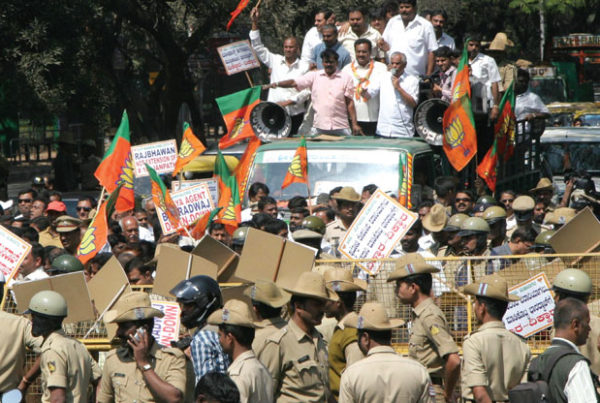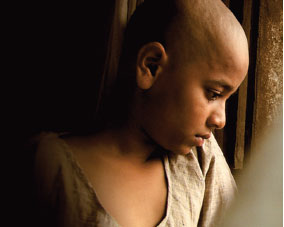Fast track courts. 123 cases. 89 convictions and 303 acquittals. Sanjana Chappalli travels to Kandhamal to find the wounds of an anti-Christian violence still festering
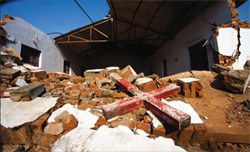 Debris: The church at Beheraga village, which was destroyed in 2008, lies untouched. Photos: Garima Jain
Debris: The church at Beheraga village, which was destroyed in 2008, lies untouched. Photos: Garima JainTHE FIRST look is deceptive — Pira Digal seems unusually calm as she walks the dusty road, her bright blue sari primly tucked in place. There is no frown on her face despite the blazing sun. A second later, she offers to take us to her colony. In the colony, amid scattered rags and pitched plastic tents, she introduces herself as the widow of Kanteshwar Digal who was hacked to death in August 2008 during the communal violence that ravaged Orissa’s Kandhamal district.
“I am no longer angry because I lost my husband. I have come to terms with his death. But how can I forget that the court set the men who killed my husband free? Will someone tell me what the word ‘justice’ means?” asks Pira. As her composure crumbles, giving way to angry tears, Pira flings a file of papers to the ground. Among the papers that fall out are copies of the First Information Report (FIR) relating to Kanteshwar’s death, court affidavits and death certificates — clear indicators of Pira’s engagement with the courts and the police as she fought to bring her husband’s killers to book.
On March 2, 2010, when the news broke that fast track courts had acquitted 52 people accused of involvement in the Kandhamal anti-Christian violence, nobody was surprised. A quick glance at the figures explains why. The two fast track courts were set up in 2008 to look into 123 cases. Sixty-three cases have been disposed of since, with 89 people being convicted. As many as 303 people have been acquitted of charges like murder, rape and burning down houses. Against this figure, news of 52 people going home — cleared of all charges — understandably evoked little interest.
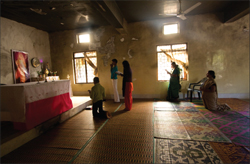 Solemn prayers: Worshippers at Divya Jyothy’s chapel at K Nuagaon. The centre was burnt down in 2008
Solemn prayers: Worshippers at Divya Jyothy’s chapel at K Nuagaon. The centre was burnt down in 2008Among those acquitted were key district BJP leaders, including Manoj Pradhan — Kandhamal’s elected representative to the Legislative Assembly. A first time MLA, Pradhan was the primary accused in eight cases with charges of murder, abetting murder and arson against him. But he was acquitted in all of them by the fast track court which pointed to the lack of conclusive evidence against him. Even if the extraordinarily high rate of acquittals triggers no alarm bells, the fact that nothing could be found to nail the district’s elected representative in eight cases makes one wonder if justice is coming undone in Kandhamal. TEHELKA travelled to the region to take a closer look at the judgements and to speak to the various stakeholders. The journey raised far more questions than expected.
Consider Pira’s account. Her husband Kanteshwar was found dead on September 16, 2008 — 14 days after he was dragged off the bus he and Pira were travelling in. The post-mortem report recorded grievous injuries to Kanteshwar’s body as well as severe internal bleeding — he had been hacked to death and strangled by a rope. Police registered a case of homicide and, during the course of investigations, recorded Pira’s statement where she said Pradhan and his associate, Mannu Ganda, had dragged her husband off the bus. The police chargesheet named Pradhan, Ganda and six others as prime accused in the case. Almost a year later, the fast track court acquitted Pradhan and Ganda of all charges by “extending the benefit of doubt”. It said there was no credible witness to the murder, and nothing to conclusively establish that the accused had committed the murder, since there was a 14-day delay between Kanteshwar’s disappearance and the discovery of his decomposed body.
‘HOW CAN I FORGET THAT THE COURT SET MY HUSBAND’S KILLERS FREE,’ SAYS PIRA, A WIDOW
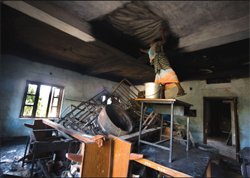 Moving on: A volunteer cleans up at Jana Vikas head office 18 months after it was burnt down
Moving on: A volunteer cleans up at Jana Vikas head office 18 months after it was burnt downAsk Pira about the judgement and why Pradhan and Ganda were released and she minces no words. “Right from the time the FIR was filed, I knew that Pradhan would get away scot free. Neither the police nor the courts are blind to the power he wields in this region. Not everyone can withstand the harassment,” she says.
Pira should know. For a year now, Pira and her family have been harassed and threatened with dire consequences by Pradhan’s associates if they proceeded with the case. She stood her ground — only to have the judge dismiss her testimony as questionable. Pira adds that the police investigation has been shoddy and incomplete. When she approached police, hours after Kanteshwar was dragged off the bus, Pira was packed off and told to return if her husband did not return home. Five days later, when her brotherin- law went to the police station, police recorded Kanteshwar as “missing”, even though Pira and others insisted that he had been dragged off the bus and killed. In his judgement, Judge CR Dash pointedly referred to this “change” in the witness’ statement. He also cast doubt over Pira’s ability to identify Pradhan in the crowd since she had never met him previously. Pira responds in a tone that barely conceals her anger: “Do I have to meet Rahul Gandhi to recognise him?”
Pira’s case is not an isolated one. Of the eight cases that TEHELKA tracked, the judgments in each cast doubt over the witnesses’ statements and the shoddy police investigation. In another case against Pradhan, the MLA was acquitted on charges of rioting and setting Butia Digal’s house ablaze after the judge, SK Dash, questioned the credibility of Butia’s testimonies and that of seven other witnesses. The judge found it incredible that the witnesses had recognised Pradhan, even though the incident took place “during the dark night and in an area without electricity”. The homes, in this case, were completely burnt down — they were doused with kerosene before being set alight. The fact that the witnesses could see the faces of the people because of the flames went unquestioned.
ANOTHER FACT that Justice Dash brought up to cast doubt about the police investigation was Butia’s age. At the time of recording statements, the investigating officer at Raikia police station noted Butia’s age as 35 when he was actually 60. The judge added that the investigating officer did not mark the exact location of the bush behind which the witnesses hid and watched their homes being burnt down. These facts were sufficient for the judge to give Pradhan the benefit of doubt and acquit him of all charges.
WITNESSES HAVE BEEN THREATENED TO WITHDRAW THEIR CASES OR TO GIVE FALSE TESTIMONY
These acquittals come amid several instances where witnesses filed affidavits before the same courts alleging threats to withdraw their cases or to give false testimonies during cross-examination. In the affidavits that TEHELKA accessed, the witnesses clearly name the case accused as the ones issuing the threats. In Bodimunda village that falls under Tikabali police station, the threats went a step further. Last month, Hindus attacked Christians who continued to attend court hearings, unmindful of the threats they had been issued. The plastic tents that the Christians had pitched just outside the village were torn apart and a series of cases filed against them. The police registered five cases — three against Christians and two against Hindus in the village. Fearing for their lives, the Christian residents of Bodimunda fled to Bhubaneswar.
When TEHELKA approached Pradipta Panigrahy, the police inspector in charge of Tikabali police station, she admitted on record that the situation in the village had gotten out of hand since “there were four or five Hindus — members of the RSS (Rashtriya Swayamsevak Sangh) — who paid no heed to the police or the district administration reconciliation efforts”. She added: “The police have no control over them and in any case, bail is accorded to them in all the cases we register against them.” (A month after the violence broke out, the case in which the Bodimunda villagers were appearing as witnesses was disposed of by the fast track court. All the accused were acquitted.)
In November 2009, Orissa Chief Minister Naveen Patnaik filed a written admission in the Assembly where he said “85 persons of RSS, 321 persons of Vishwa Hindu Parishad and 118 persons of Bajrang Dal had been arrested for their involvement in the Kandhamal riots”. The question is: will the fast track courts set up by Patnaik’s government deliver the justice due to those affected by the violence? On last count, there were 71 cases waiting for that justice to be delivered.
FACT FILE
FAST TRACK COURT 1
(117/42/2009)
18 people acquitted
“… Occurrence is true but no convincing, credible and satisfactory evidence… to eradicate suspicion that witnesses recognised accused during dark night by staying at some distance… hence (presence of)… accused at scene of occurrence is doubtful”
FAST TRACK COURT 2
(23/2009)
Manoj Pradhan and 1 other acquitted
“Witness had no acquaintance with accused prior to incident and hence cannot say that he was also present amongst the mob…”
FAST TRACK COURT 2
(08/2009)
4 people acquitted
“… Overwhelming evidence of homicide”… taking place “in course of the riot by members of an unlawful assembly…” but prosecution failed to connect accused to scene. “… accused passed through spot but did not cause any harm…”
FAST TRACK COURT 1
(48/16 of 2009)
Manoj Pradhan acquitted
“Informant is aged 35 years at time of examination. But during course of trial it was found that he is aged 60 years… doubtful if investigating agency has examined the right person…”
—
This article was originally published in Tehelka, a leading independent news magazine in India, known for its investigative journalism.
